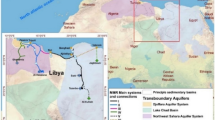Abstract
The study carried out jointly by the Politecnico di Torino and the Ufficio Cave of Regione Piemonte examined the most troublesome interferences between quarry exploitation and other land uses alongside the river Po, south of Turin. Here a great number of large alluvial aggregate quarries, whose excavations extend below the water table, have long been active.
Detailed geological and topographical investigations have been carried out, together with geophysical prospecting work (by electrical methods) and hydraulic tests on wells.
The results of the investigations have permitted the setting up for the quarries involved of rational guidelines for the protection of the groundwater resources and of soil stability.
The necessity of systematic preliminary studies, according to the law presently in force, is stressed for new quarries to be opened. Investigations should also involve an adequate number of exploration drillings and water pressure measurements, to determine the amount and the quality of the alluvial deposits as well as the hydraulic characteristics of the aquifers and the geotechnical properties of the ground where the excavation work has to be made.
A rational program of land recovery, and an exploitation plan respecting other land uses, can be set only in the light of the aforesaid studies.
Résumé
La recherche, exécutée en collaboration entre le Politecnico di Torino et l'Ufficio Cave de la Regione Piemonte, a eu pour but d'étudier les interférences les plus importantes entre l'activité d'exploitation et l'aménagement du territoire, crées dans la zone Sud de Turin, le long du fleuve Po.
Dans cette zone existent depuis plusieurs années de grandes carrières de granulats alluviaux, situées sous la nappe d'eau. On a effectué des prélèvements géologiques et topographiques détaillés, une prospection géoélectrique et des mesures hydrauliques dans des puits.
Les résultats obtenus ont permis de tracer, pour les carrières en activité, des zones rationnelles pour la protection des ressources aquifères et la stabilité des terrains.
Pour les nouvelles carrières prévues dans la zone on a souligné, en accord avec les lois en vigueur, la nécessité d'études préliminaires systématiques; ces études devraient déterminer, à l'aide de sondages mécaniques et de mesures pièzométriques assez nombreuses, la quantité et la qualité des matériaux alluviaux, les caractéristiques hydrauliques des nappes aquifères et les propriétés géotechniques des terrains objets d'excavation.
De cette façon seulement il sera possible de proposer un programme réaliste pour la remise en état des sites, en sauvegardant les autres types d'aménagement du territoire.
Similar content being viewed by others
Author information
Authors and Affiliations
Additional information
Quarries Office of the Piedmont Regional Administration.
Rights and permissions
About this article
Cite this article
Armando, E., Di Molfetta, A., Fornaro, M. et al. Exploitation of aggregates in the river po basin, near Turin, Italy, and its impact on the environment. Bulletin of the International Association of Engineering Geology 29, 211–216 (1984). https://doi.org/10.1007/BF02594404
Published:
Issue Date:
DOI: https://doi.org/10.1007/BF02594404




